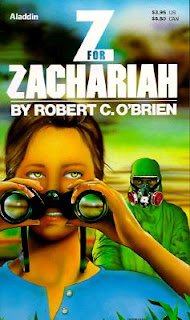Shallow Villainy Does not a Good Story Make
Current Reads: Orsinian Tales by Ursula K. Le Guin
Attack of the Copula Spiders by Douglas Glover
Sabriel by Garth Nix
Current writing projects: Same as last time
This weekend I watched the film The Legend of Zorro with Antonio Banderas for the first time. I have not seen the first film with Banderas as Zorro, but I enjoyed watching the old black-and-white Disney series Zorro in reruns when I was a kid and I thought I would give this newer version of Zorro a try. What I found was unsurprisingly a fun action movie with lots of sword fighting and acrobatics and a decent storyline. My issue with the film was its secondary villain, the one who opens the film: Jacob McGivens (whose name I had to look up because I don't ever remember hearing it in the film itself). This man appears at the start of the film with a brand of a cross scarred into his face and shouting that he is there to "Do the Lord's work," a line which does not convince the priest and the townsfolk he is addressing. This line is McGivens' mantra, and he uses some form of it in almost every scene he has in the film. He also misquotes the Bible when he is extorting a farm couple off of their land. He cites something that sounds like it comes from from the Old Testament (it sounds like something from the Books of Moses or possibly Joshua, but I am not certain of the exact reference if it is Scriptural) about casting the dwellers of the land out before you. Obviously, the verses (if they are) are referring to God's promise to the Hebrews inhabiting the Promised Land and have nothing to do with the actions of McGivens and his lackeys. McGivens also has guns he calls Salvation and Damnation and talks of sending someone out as a "sheep amongst wolves." So what is the issue? Sounds like your typical crazy religious villain, right? Well, that's the problem. That is all this character is: a murdering maniac who uses God as a shield. He is never given a reason for doing what he does with such a religious flair. No backstory, comments, or insight are offered to the audience. We are simply supposed to accept that he is crazy and somewhat religious.
That is just shoddy writing.
I understand that there are villainous people who claim Christianity or any number of other religions as their driving force. What bothers me about this particular character is that he is not rounded out and given a motivation. Any good writer will tell you that word motivation is the most important aspect of any character, and I would say it is especially important when writing a villain, a bad guy, an antagonist, whatever you want to call him or her. If there is no clear, understandable motivation, the character will be flat and uncompelling.
I am going to take a hint from a friend of mine and use as my example of a well-rounded villain Loki from the film Thor. I won't go into his role in The Avengers because I have not seen it and that would not be entirely fair to McGivens. He only gets one movie, so those I compare him to should as well.
A quick recap of Thor and Loki's character and role: Loki is the adopted son of Odin and the natural son of the king of the Frost Giants, who are shown at the film's opening to be the more villainous of the two alien races we are introduced to. Loki and Thor (Odin's natural son) are shown to have a friendly sibling rivalry and both boys say that they will rule the heavenly world of Asgard fairly when they grow up, but only one of them will be able to rule. It feels a bit like Prince of Egypt, actually. When we fast forward to the present day, Loki is shown to be a person capable of smooth-talking almost anyone into anything, with his brother Thor being possibly the one exception. He is very charismatic and convincing. When Thor's almost-coronation is interrupted by Frost Giants and Thor decides to strike back in retribution, Loki does his best to convince him otherwise and even has their father alerted of the trip after they have gone so that Thor will not be injured.
Sounds like a great little brother, right?
Except it quickly becomes clear that Loki has a sneaky plan in the works, one which includes having his brother banished from Asgard and claiming the throne for himself. He has a close and loving relationship with Odin, and soon learns of his true heritage as a Frost Giant. Not only that, but Odin tells him of a plan that had been in place since Loki and Thor were boys: a plan which has been ruined by Thor's arrogance and Loki's interference. Loki later lies to Thor by saying that Odin has died (he is only in a coma-like state called "Odin-sleep") and that Thor will never be allowed to return (Odin had said Thor could return if he proved himself worthy). Loki continues to manipulate and lie to everyone around him with his ultimate goal being revealed in the last few minutes of the film: he wanted to destroy the Frost Giants completely, just as Thor did initially. Odin tells Loki that this plan is neither wise nor good. His last words to Loki are "No, Loki," a refusal to agree with Loki's plans for annihilation of a race, and Loki falls into the cosmos, seemingly gone for good.
To make everything just a little bit worse, in the credits scene it is revealed that Loki is now controlling the mentor of the human protagonist Jane Foster, Erik Svenson. Another friend of mine has even suggested that Loki was controlling him throughout the film, and not just at the end.
What Loki demonstrates is that a villain can still be sympathetic and is more compelling when given a backstory and a motivation. His ultimate goal is even one that we sign up for (at least a little bit) at the film's beginning when Thor suggests it. He is not simply an evil person out to destroy everything. He has a noble intention at the heart of his motivation: protecting his family. He just has a strange way of pursuing that goal.
You may have noticed that I went from a secondary villain to a primary one in my comparison. To be completely fair, I will also offer a secondary villain who bears a striking similarity to Jacob McGivens. I am referring to Caleb from the seventh season of Buffy the Vampire Slayer. Like McGivens, Caleb is a preacher man out to destroy those he sees as unfit, in this case all the potential vampire slayers across the globe. He similarly spouts Biblical words and similarly-styled phrases. However, Caleb has that one simple thing that McGivens lacks: motivation and backstory. Caleb's motivation is tied into his backstory (as it should be). He has been approached by the First Evil, often called simply the First. The First has convinced Caleb that the Slayer (Buffy) and all those who are like her and help her are really serving evil in the end and they must be stopped, preferably killed. Caleb's presence haunts the entire seventh season of Buffy, mostly appearing offscreen during Buffy's dreams about the potential slayers being killed. He finally appears in the final five episodes of the season, killing and causing lots of mayhem, but always with his drive to kill Buffy and her friends.
My point is, if you are going to write a villain, do not go to the Stereotyped Villain Kit TM. It won't help your writing that much.



Does this mean youre working on a villain story/stories for your thesis?!? Cause yippee if you are! -Mags
ReplyDeleteMags,
ReplyDeleteI haven't got any stories in the works with villains per se, but there is definitely a theme of complex characters and antiheroes going on in these stories. Actually, now that I think of it I do have one story whose main character is someone I would classify as a villain. It's been a while since I've looked at that one so it slipped my mind.
For some further villainy tips, I recommend this blog. They ask some pertinent questions there that ay help you figure stuff out:
ReplyDeletehttp://furtherup-and-furtherin.blogspot.com/2012/05/beautiful-people-evil-edition.html